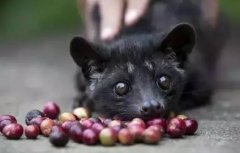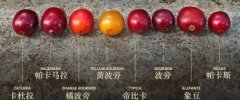The truth of cat shit and animal abuse shows ivory hypocrisy and bitterness.

For professional baristas, please follow the coffee workshop (Wechat official account cafe_style)
At a time of pressure from animal protection groups, a Canadian businessman took inspiration from the intestines of animals and launched an elephant dung coffee (later blackened ivory coffee Black Ivory Coffee). Responsible for the production are 30 elephants from the Asian Elephant Foundation (The Golden Triangle Asian Elephant Foundation) in the Golden Triangle in northern Thailand. In addition to grass and bananas, their daily feed includes an unknown proportion of Arabica coffee fruits.
It is really wonderful to use elephants as contract manufacturing machines. They are large, digest more food every day than civets, and excrete more faeces. Manufacturers even focus on the point that "elephants are vegetarian", boasting that their intestines are purer and that the sugar content of bananas makes coffee beans less bitter and more mellow during the long fermentation process. The author believes that the addition of coffee fruit to the feed of vegetarian animals is more virtuous than forced meat-eating civets to become vegetarian. However, it is unflattering to use the above argument to support that "elephant dung smells better than cat dung". To produce 1 kilogram of elephant dung coffee, 33 kilograms of coffee fruit is needed. Many of them were bitten or lost in the grass. Workers pick up coffee beans from the dunghill, wash them, and remove defects. Such a rare food is naturally expensive: a pound of ripe beans costs $500. Only a few five-star resorts are available in Maldives, Abu Dhabi and Thailand.
A faint smell of grass.
The theory that "intestinal enzymes can reduce the proteins that cause bitterness" cannot stand up to scientific scrutiny: there are many causes of coffee bitterness, from planting to roasting and brewing. Take a step back and assume that if such a "bitter protein" does exist, it will also be reorganized under the influence of the Maillard reaction effect in a bean oven as high as 200 degrees Celsius, and the taste will change again and again: what is bitter may decompose and sublimate, while what is not bitter before can also become bitter as a result of burning.
As can be seen from the website, hotel staff must be trained by bean vendors to improvise with a high-end Lido hand grinder and a 19th-century Belgian balanced siphon pot (balancing syphon) before cooking a $50 cup of dung coffee for guests. Although the former is indeed the top hand grinder on the market today, it is extracted from Belgian pots that can be regarded as antiques, just like taking an abacus to take a math exam: it is more observable and more creative. Modern coffee extraction is quantified and beautifully furnished, not as crisp as a funnel, a pound and a pot of water.
The boss of the company attaches great importance to the evaluation of products on the Internet. When someone mentions Elephant dung Coffee in the coffee discussion area, he always leaves a message under his real name to introduce the benefits of Elephant dung Coffee. Apart from the so-called selling point of "low bitterness, rarity and humanity", it is also stressed that 8% of the profits will be donated to the elephant farms responsible for producing coffee. The beneficiary fund directors also made every effort to cooperate, issuing a statement stressing that the elephant's body will not be affected by caffeine. They explained that caffeine is locked in the nucleus and will not be absorbed by the elephant body. This icing on the cake is a slap in the mouth: the industry knows that the whole coffee fruit contains caffeine, from leaves to fruits. Cascara fruit tea contains caffeine, which comes from the flesh of sun-dried coffee. And caffeine has high water solubility and is bound to ooze during digestion. One of the ways to make decaf coffee (Swiss water) is to soak the caffeine in the beans with water. The so-called saying that it is locked in the core highlights the ignorance of businessmen.
The paper says, "Black Ivory Coffee has a faint taste of grass."... " Maybe he doesn't know that in the eyes of the cup tester, the taste of grass is a negative adjective for improper baking.
Important Notice :
前街咖啡 FrontStreet Coffee has moved to new addredd:
FrontStreet Coffee Address: 315,Donghua East Road,GuangZhou
Tel:020 38364473
- Prev

The truth of cat shit and animal abuse shows that ivory is hypocritical and bitter.
Professional baristas please follow the Coffee Workshop (Wechat official account cafe_style) recently it was reported in the newspaper that in response to an appeal from PETA Asia-Pacific, a five-star hotel decided to stop selling civet coffee (commonly known as Kopi Luwak), which was produced in an inhumane way, and once again aroused public concern about animal protection. PETA sends undercover agents into the farm.
- Next

How the Geisha Rosa Coffee changed from an ugly duckling to a swan
Professional barista communication Please follow the coffee workshop (official Wechat account cafe_style) if a geisha were a princess, who would be her prince? This poetic sentence comes from a young girl. As for her other identity, she is a coffee fanatic. God in a Cup geisha (Geisha) is located in the mountains of western Ethiopia, the source of coffee, rather than a traditional occupation in Japan. Such as
Related
- Detailed explanation of Jadeite planting Land in Panamanian Jadeite Manor introduction to the grading system of Jadeite competitive bidding, Red bid, Green bid and Rose Summer
- Story of Coffee planting in Brenka region of Costa Rica Stonehenge Manor anaerobic heavy honey treatment of flavor mouth
- What's on the barrel of Blue Mountain Coffee beans?
- Can American coffee also pull flowers? How to use hot American style to pull out a good-looking pattern?
- Can you make a cold extract with coffee beans? What is the right proportion for cold-extracted coffee formula?
- Indonesian PWN Gold Mandrine Coffee Origin Features Flavor How to Chong? Mandolin coffee is American.
- A brief introduction to the flavor characteristics of Brazilian yellow bourbon coffee beans
- What is the effect of different water quality on the flavor of cold-extracted coffee? What kind of water is best for brewing coffee?
- Why do you think of Rose Summer whenever you mention Panamanian coffee?
- Introduction to the characteristics of authentic blue mountain coffee bean producing areas? What is the CIB Coffee Authority in Jamaica?

